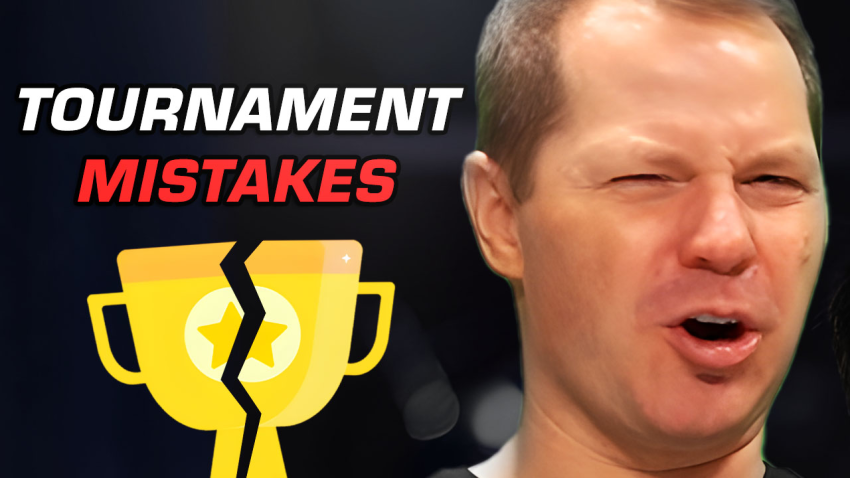Poker tournament mistakes can severely undermine your chances of success in this thrilling arena of competitive gaming. Many players, especially novices, often overlook essential poker strategy tips and fail to recognize common pitfalls that can lead to early exits. In this article, we will delve into the top five poker tournament mistakes to avoid, equipping you with valuable tournament poker advice to enhance your game. By identifying and addressing these crucial errors, you can sharpen your poker playing strategies and increase your odds of emerging victorious. Join us as we guide you through insightful expert advice tailored to help you navigate the high-stakes world of poker tournaments.
As you step into the vibrant world of competitive poker tournaments, it’s imperative to grasp the intricacies of gameplay. While elements of chance are undeniably present, a strategic mindset and disciplined approach often prove to be the deciding factors between victory and defeat. Unfortunately, aspiring players tend to stumble upon various fundamental errors that jeopardize their performance and prospects. Thus, understanding the nuances of tournament play becomes essential for crafting a winning strategy. In this article, we will uncover key aspects and strategies to avoid critical tournament mistakes that can lead to diminished success.
Understanding Common Poker Mistakes
When embarking on the journey of poker tournaments, recognizing common poker mistakes can be pivotal for achieving success. Each tournament presents a unique set of challenges, and understanding these pitfalls allows players to craft effective poker strategies. Beginners often overlook essential aspects of the game, including their position at the table or the concept of pot odds. This lack of awareness can lead to poor decision-making, ultimately diminishing their chances of advancing deeper into the tournament.
Moreover, common poker mistakes also include the tendency to play too many hands or chase losses, which can derail even the most promising players. Developing a keen awareness of these issues is crucial. By internalizing practical poker strategy tips—like narrowing hand play in early stages or maintaining emotional control after losses—players can begin to carve their own path to success. Achieving mastery in this game is not merely about the cards dealt but rather about the mindset and strategies employed throughout the tournament.
Avoiding Poker Tournament Mistakes to Enhance Strategy
To enhance your poker playing strategies, it’s imperative to actively avoid common tournament mistakes. As players navigate the various stages of a tournament, adapting strategies becomes essential. For instance, playing aggressively in the early stages might build your stack, but as the blinds increase, a more conservative approach could be warranted. Developing an understanding of when to switch gears, as well as avoiding the internalized mindset of fearing losses, can elevate a player’s performance considerably.
Another crucial aspect of avoiding poker tournament mistakes involves the awareness of not overvaluing hands. Many players falter under the illusion that a seemingly strong hand is always enough to win. Instead, one must practice situational awareness and understand that context is key—an impressive bluff or a well-timed fold at the right moment can sometimes speak louder than the strength of one’s hand. By focusing on these elements and implementing expert tournament poker advice, players can enhance their strategies and stay ahead in the competition.
Frequently Asked Questions
What are common poker tournament mistakes players should avoid?
Common poker tournament mistakes include playing too many hands, ignoring your position at the table, chasing losses when on tilt, failing to adjust strategies throughout the tournament, and overvaluing hands in uncertain situations. By identifying these pitfalls and implementing disciplined poker strategy tips, players can enhance their chances of success in tournaments.
How can I improve my poker tournament strategy and avoid mistakes?
To improve your poker tournament strategy and avoid mistakes, focus on playing selectively, especially in the early rounds, and always be mindful of your position relative to the dealer. Avoid emotional plays like chasing losses, and adapt your approach as the tournament progresses. Understanding when to be aggressive and when to fold weaker hands is crucial for avoiding costly poker mistakes.
| Mistake | Description | Expert Insight | Related Strategies |
|---|---|---|---|
| Playing Too Many Hands | Entering too many pots, especially early in a tournament, can lead to losses. | Be selective and play fewer, stronger hands based on position. | Know your opponents’ tendencies and be aware of your position. |
| Ignoring Position | Neglecting table position can result in poor strategic decisions. | Utilize late position to observe and adjust your strategy. | Adjust hand selection based on your position relative to the dealer. |
| Chasing Losses | Playing recklessly after losing a hand can lead to further losses. | Maintain a disciplined mindset to avoid tilt. | Set limits for losses and take breaks to regain composure. |
| Not Adjusting Strategies | Failing to adapt your strategy to tournament stages can be detrimental. | Be flexible and adjust your approach based on tournament dynamics. | Play aggressively in early stages, then tighten play in later stages. |
| Overvaluing Hands | Investing heavily in questionable hands can lead to costly mistakes. | Evaluate board texture and opponent behavior before betting. | Assess the strength of your hand against community cards and opponents. |
Summary
Poker Tournament Mistakes can significantly hinder your gameplay and lead to early exits from the competition. Understanding these pitfalls is crucial for any aspiring player looking to improve their skills. From playing too many hands to not adjusting strategies, these common mistakes can undermine even the most talented players. By recognizing and avoiding these errors, you position yourself to take full advantage of each game. Always remember that poker is not just about luck; it requires a strategic mindset, discipline, and the ability to stay calm under pressure. With this knowledge in hand, you can approach your next tournament with confidence and greatly increase your chances of success.
